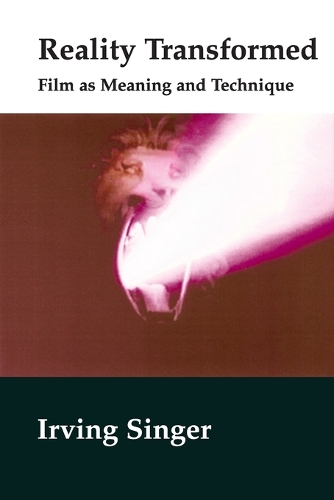
Reality Transformed: Film and Meaning and Technique
(Paperback)
Publishing Details
Reality Transformed: Film and Meaning and Technique
By (Author) Irving Singer
MIT Press Ltd
MIT Press
25th August 2000
United States
Classifications
Tertiary Education
Non Fiction
791.4301
Physical Properties
Paperback
230
Width 152mm, Height 229mm, Spine 15mm
318g
Description
Since the late 1960s film theory has been dominated by "grand theories" that examine motion pictures from a psychoanalytic, semiotic, or Marxist point of view. Irving Singer offers an approach to the philosophy of film by returning to the classical debate between realist and formalists - he shows how the opposing positions may be harmonized and united. He accepts the realist claim that films somehow "capture" reality, but agrees with the formalist belief that they transform it. Extending his earlier work on meaning in art and life, he suggests that the meaningfulness of movies derives from techniques that re-create reality in the process of presenting it to viewers who have learned to appreciate the aesthetics of cinematic transformation. Singer concentrates on questions about appearance and reality, the visual and the literary, and the interplay between communication as a goal and alienation as a hazard in films of every sort. In three chapters he provides suggestive reading of Woody Allen's "The Purple Rose of Cairo", Luchino Visconti's "Death in Venice", and Jean Renoir's "The Rules of the Game". The book should be of interest to the general reader as well as students in all fields related to film studies.
Reviews
There has been a traditional split in film studiesbetween the Bazinians and the Eisensteiniansthose who believe themedium has a special aptitude for reality and those who would stress itspurely formal and autonomous characteristics. This soberly argued bookattempts to make peace using philosophical humanism. Taking as hispremise the currently unfashionable idea that narrative cinema hassomething to do with life, Singer demonstrates how it transforms ourcommon experience into art.
* Sight & Sound *There has been a traditional split in film studies between the Bazinians and the Eisensteiniansthose who believe the medium has a special aptitude for reality and those who would stress its purely formal and autonomous characteristics. This soberly argued book attempts to make peace using philosophical humanism. Taking as his premise the currently unfashionable idea that narrative cinema has something to do with life Singer demonstrates how it transforms our common experience into art.
* Sight & Sound *Author Bio
Irving Singer was Professor of Philosophy at MIT. He was the author of the trilogies The Nature of Love and Meaning in Life, Philosophy of Love- A Partial Summing-Up, Mozart and Beethoven- The Concept of Love in Their Operas, all published by the MIT Press, and many other books.
